Motivation Management Criteria
Propaganda of a healthy way of life is a strong commercial way of selling a bill of goods jus for the sake of business.
Together with this kind of commercial lies rather than taking care of population, the non-profit organizations are being founded.
Unlike business organizations, social ones do not openly claim they make money out of this.
However, there are not only volunteers providing services to HIV carrier, there is money as people’s partial motivation.
Every non-profit organization has to earn at least something to pay taxes. So, there is evidently some financial interest in founding social services. However, most of the services are provided free of charge.
The theory of deception influence among the employees of the non-profit organizations can be examined using an organization called Allan Vincent Smith Foundation. This is an organization that provides education on AIDs awareness to HIV infected people. Although the organization is a non-profit one, it happens to be a very good reflection of what the Information Manipulation Theory is. The presentation will unveil how deception theory influences group outcomes and how to balance organization’s management needs with its bottom-line effectiveness.
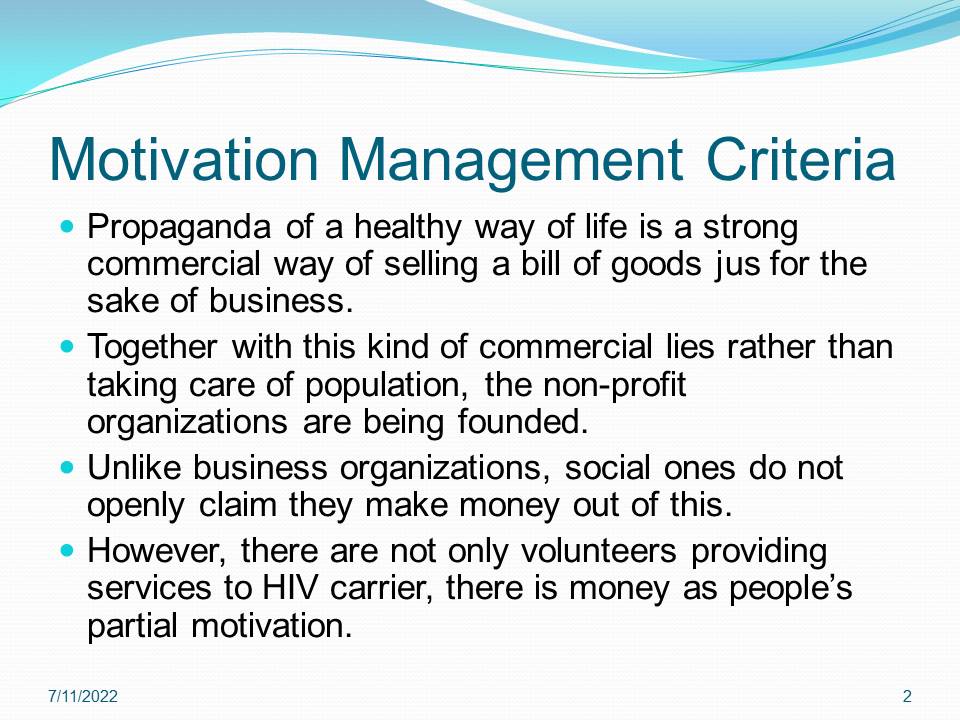
Psychological Premises to Deception Adoption
People differ, so do their psychological strengths and weaknesses. Thus, managers have to keep up with break-neck speed of changing business environment (Jones, 2010).
To keep the organizations like that working on and truly helping people, there has to be a deception management philosophy adopted. Disregarding controversial feelings, this management theory may arouse, it brings much positive effect and is not, in fact, immoral (Qin, 2009).
One of the issues that come forward is negotiating conflicts. Nowadays, there are two means of forcing the negotiation: the instant messaging and face-to-face discussion (Zhou, 2008).
It has to be highlighted that forcing the negotiation via messaging is unlikely to detect deception in most cases.
The motivation of the volunteers to continue working as passionately as always creates the main premise to the deception theory.
Therefore, the overall concept of working with HIV infected has to be taken into consideration, as well as psychological effect that healthy people undergo when working.
There are many features a manager has to consider when organizing a good working environment within an organization. Negotiating conflicts means bringing them to the point when both sides are satisfied with the discussion or the decision making. Therefore, the means the discussion is exercised though is very important.
Interestingly, the communicators claim that they are satisfied with this kind of negotiations more than talking face-to-face.
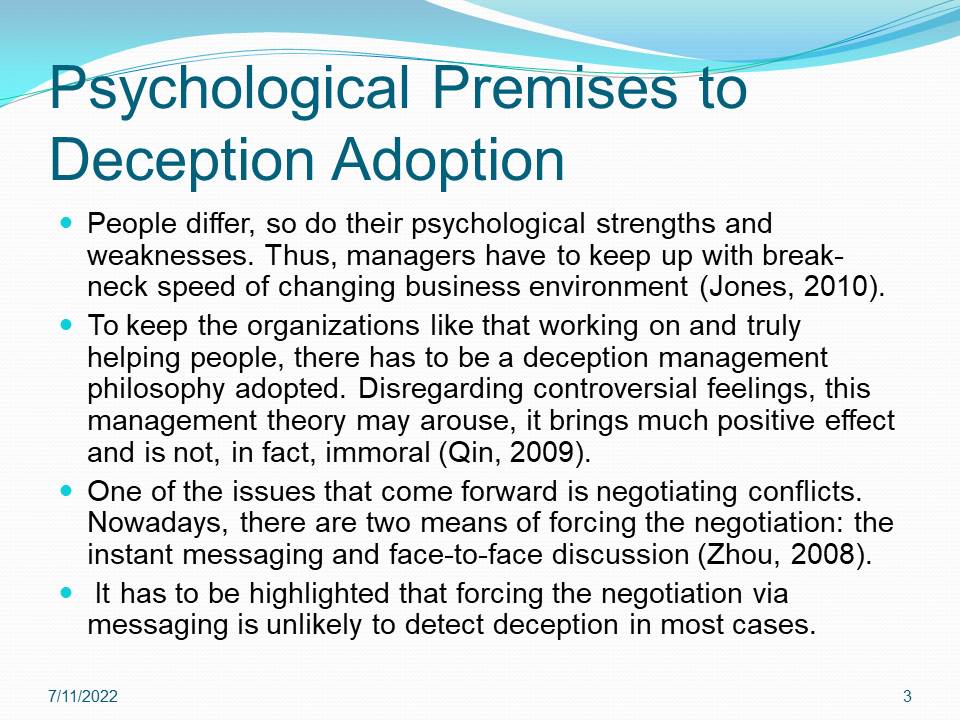
Positive Effects of Deception
It is important for a manager to talk to people employed saying that the education is helping HIV infected and what they do is influencing patients’ survival potential.
Although every conscious person understands that education on HIV treatment is only a partial guarantee of adherence to the rules taught, still there has to be a good motivation for the volunteers to prolong their duties.
Contemporary world offers unexpected business strategies that bring results (Bateman, 2007). Thus, such motivation can be considered as deception in this case.
A receiver (in a conversation) gets to sense a hidden agenda or lies, he/she is likely to express protest which is usually met by the tension of the initiator. That is why an individual is likely to trust the lies he/she is told if this is a way to avoid tension or conflicts. Therefore, it is necessary to determine a positive effect of deceptions exercised by an individual within an organization. Taking into consideration the specific audience and a purpose of the non-profit organization taken to discuss, it is relevant to say that lots of employees/volunteers drop off on the half-way.
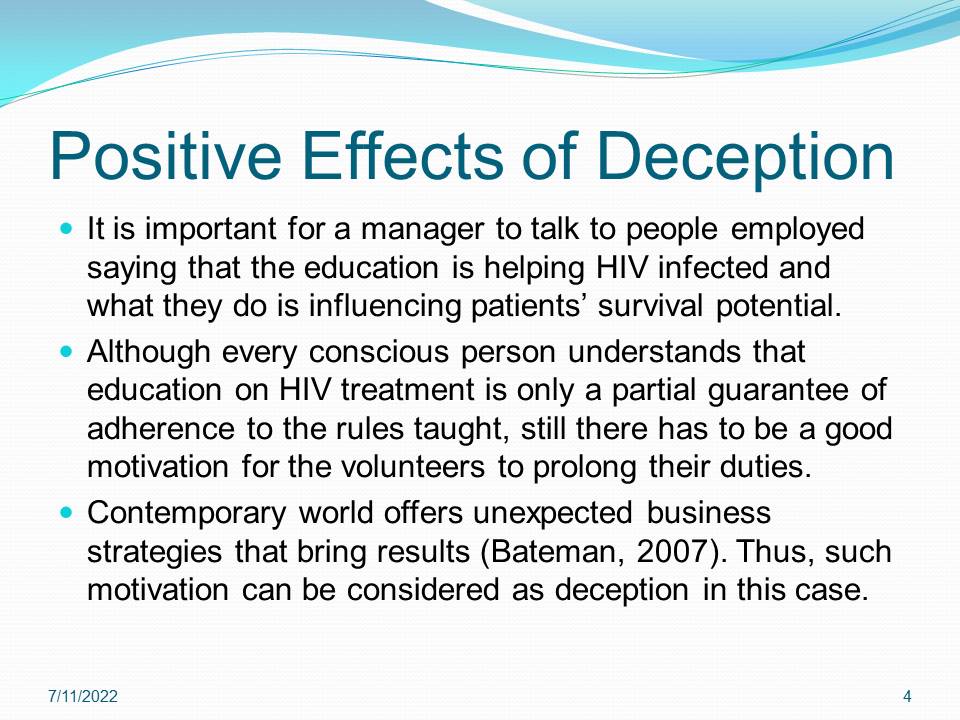
A Scheme of Adaptation of Philosophy
- the manager exercises deception through instant messaging system;
- the level of tension from computer-mediated negotiation becomes high because the person being deceptive experiences higher tension due to the hidden agenda;
- the undetected deception in instant messaging can lead to negative effects, however, and not bring any prolific results;
- the later, nevertheless, improves the skills of negotiators and the individualistic goals.
The instant messaging system should be used when initiating a philosophy of making employees work the way a manager wants them to. This way a receiver of the information can read the info over again and get everything right once again.
As we can see from the scheme of the theory adaptation, there is no way we cannot get at least some kind of result. In fact, both ways out are likely to be positive. Even if the tension is not experiences and not felt by a receiver, the goal will be met. And in case there is a tension sensed by both speakers, then the negotiator’s skills will be improved.
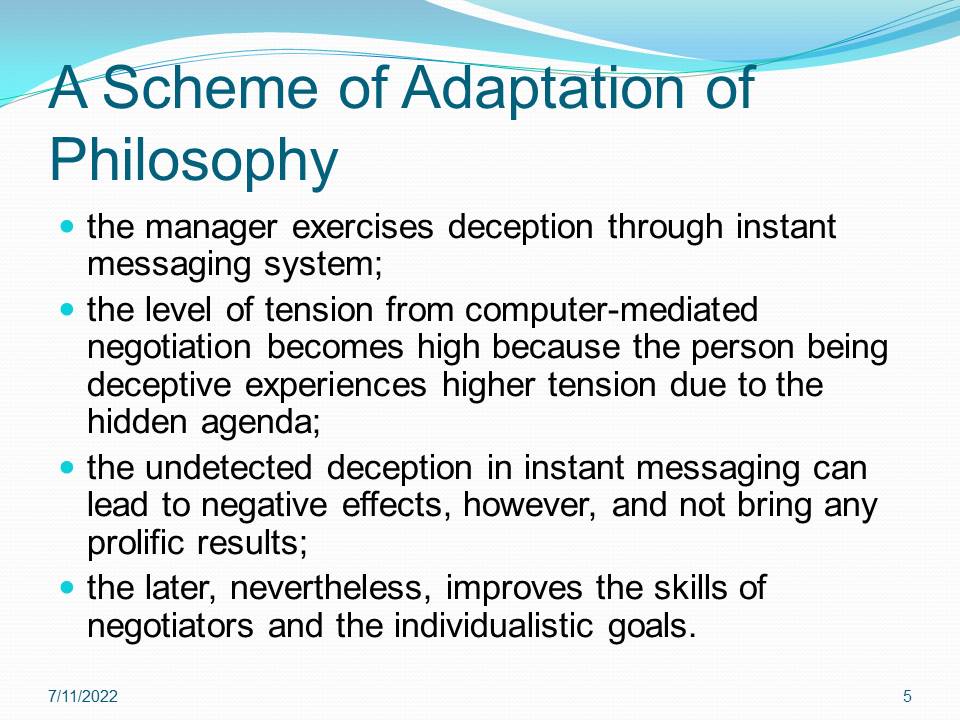
Deception Application Features
The reaction to deception exercised by an individual may differ due to:
- person’s own perception.
- organization’s course.
- the mean the deception is exercised through.
Therefore, we can clearly see that applying deception as a philosophy in management can bring positive results. It just needs to be considered that when applying hiding true values a manager needs to deliver the importance of the affair to the employees and leave out all the unnecessary detail for the sake of overall perfect results.
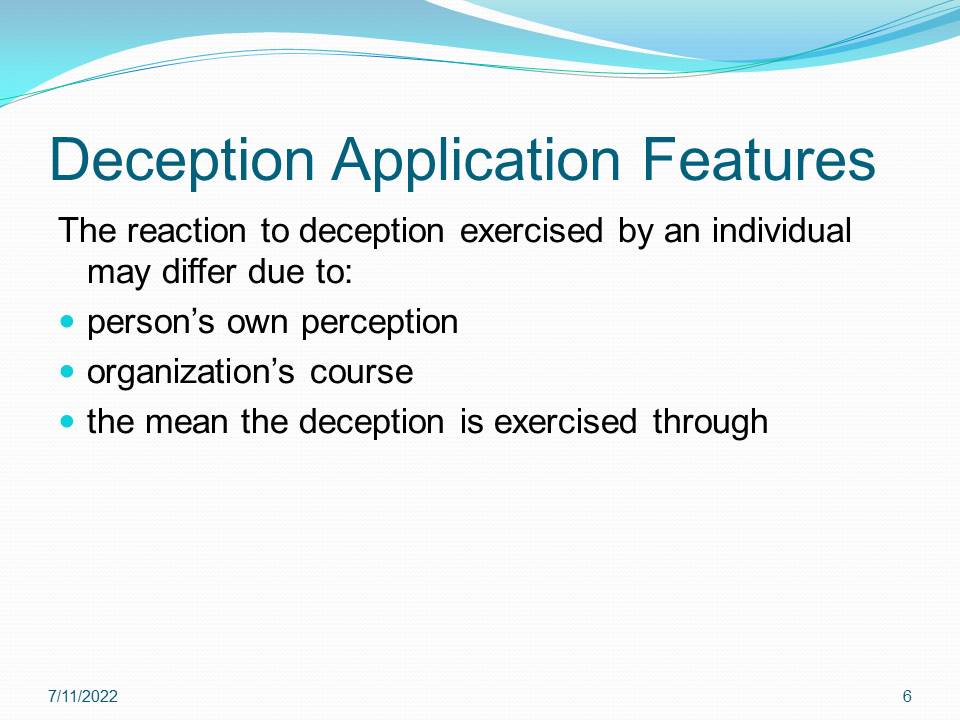
References
Bateman, T. S., & Snell, S. A. (2007). Management: Leading and collaborating in a competitive world (7th ed.). Boston, MA:McGraw-Hill/Irwin.
Jones, G. R. (2010). Organizational theory, design, and change. (6th ed.) Upper Saddle River, NJ:Pearson/Prentice Hall.
Qin, T., Burgoon, J., Blair, J., & Nunamaker, J. (2009). Modality effects in deception detection and applications in automatic-deception- detection.Proceedings of the Thirty-Eighth Hawaii International Conference on System Sciences. Los Alamitos, CA: IEEE Press.
Zhou, L. (2008). An empirical investigation of deception behavior in instant messaging. IEEE Transactions on Professional Communication, 48 (2), 147-160.